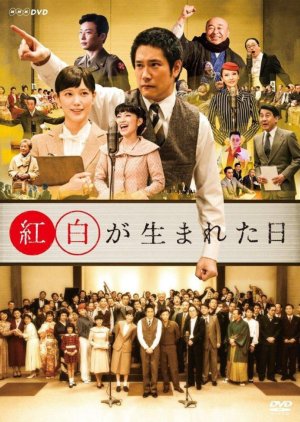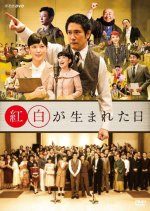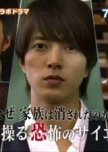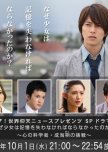After the war, the Occupation Forces’ General Headquarters was about to seize the broadcasting station, NHK, with the objective of directing its broadcasts in September 1945 (Showa 20). At that time, NHK’s director, Shindo Tatsuya, had come back from the front. Takeshita Mitsue, an announcer whom Shindo is familiar with, is forced out of work in his presence due to the demobilisation and return of male staff members. The censors of the General Headquarters are meticulous, and in particular, George Mabuchi, an American interpreter of Japanese descent, has an overbearing manner of speech that grates on their nerves for someone who looks Japanese. Although Shindo appears to give into despair, he is cheered up by the positivity of Mitsue who has been returned to do odd jobs because of her family’s circumstances. Meanwhile, Shindo and the others get instructions from the General Headquarters to think of a new music programme. Influenced by Mitsue and the people around him, Shindo writes up a proposal for the “Red & White Music Contest”. However, he receives complaints from the General Headquarters and that kills his enthusiasm. They say that the Japanese characters for “contest” in the programme name “Red & White Music Contest” will encourage war. Shindo engages in a battle of words with the General Headquarters, and manages to gain consent to call it “Music Contest”. But he is warned by Mabuchi to stick entirely to the script. On the other hand, record companies vehemently protest the attempt to pit singers against each other. Furthermore, Namiki Michiko of Ringo no Uta fame, the programme’s main attraction, turns down an appearance. She is not able to sing because she lost her family in the war. They eventually succeed in persuading her through Shindo’s fervour and Mitsue’s wit. The day of broadcast arrives. However, halfway through the telecast which had been proceeding smoothly, a serious incident occurs. Edit Translation
- English
- magyar / magyar nyelv
- dansk
- Norsk
- Native Title: 紅白が生まれた日
- Also Known As:
- Screenwriter: Ozaki Masaya
- Genres: Music, Historical, Life, Drama
Cast & Credits
- Matsuyama Kenichi Main Role
- Kobayashi TakashiMatsui ShiroSupport Role
- Honda TsubasaTakeshita MitsueSupport Role
- Izumi RikaInada BettySupport Role
- Rokkaku SeijiFurukawa RoppaSupport Role
- Yamaguchi Chisa[Singer]Support Role




















































